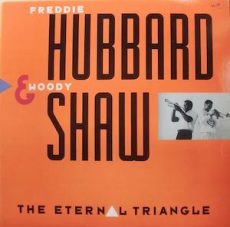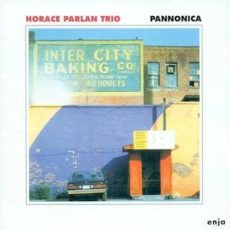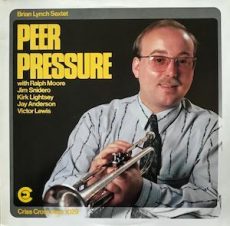
Requisites
The Eternal Triangle ~ Freddie Hubbard and Woody Shaw | By Eddie Carter
Freddie Hubbard and Woody Shaw enter this morning’s spotlight with a superb 1987 sextet album, The Eternal Triangle (Blue Note B1-48017). I’m a long-time fan of both trumpet players and have been listening to their albums recently. The Eternal Triangle is their second collaboration after Double Take, recorded and released two years earlier. Freddie is heard on the left channel, and Woody is heard on the right channel. Returning from the earlier session are Kenny Garrett on alto sax, Mulgrew Miller on piano and Carl Allen on drums. Ray Drummond takes over on bass for this date. My copy is the original U.S. Stereo release.
Down Under by Freddie Hubbard starts Side One with the rhythm section’s infectious introduction to the sextet’s danceable theme. Freddie kicks off the opening line with a strong tone. Mulgrew continues the effortless swing in the following reading. Woody makes quick work of the third solo, and then Kenny has a fine spot ahead of the ensemble’s return that fades out slowly. The Eternal Triangle by Sonny Stitt comes at you fast and furious from the sextet’s rapid-fire melody. Hubbard takes us for a high-speed ride first, and then Garrett heats things up in the second statement. Shaw steps up next for an aggressive reading. Miller gives a spirited presentation, and Carl ends the solos with a brisk workout into the reprise and quick stop.
The Moontrane by Woody Shaw takes off with him leading the ensemble in a lively melody. Woody is the first soloist, and he comes out swinging. Kenny gives a brisk reading in the second spot. Freddie adds a bit more fuel to the fire in the following statement, and Mulgrew leads us to a swinging conclusion with an inspired interpretation. Side Two gets underway with the sextet keeping its foot on the gas for Calling Miss Khadija by Lee Morgan. It begins with the rhythm section’s introduction; then, the front line joins in for the melody. Shaw ignites the song’s first brightly burning flame. Miller whets our appetite further in the second statement, and then Hubbard has a few memorable moments next. Garrett comes in to give a sizzling solo, and Carl gets the last word in a vigorous finale before the ensemble returns.
I first heard Freddie Hubbard’s Nostrand and Fulton on an earlier album, Here To Stay. The song’s title comes from a Brooklyn intersection, and the sextet begins the melody vibrantly. Freddie dives into the opening solo and wails, then Kenny follows with some heated sax play. Woody tackles the next reading with passionate fire, and Mulgrew closes with a very enthusiastic statement ahead of the theme’s reprise and conclusion. Tomorrow’s Destiny by Woody Shaw is off to the races from the sextet’s opening chorus. Miller is up first with a solo of high-spirited delight. Shaw goes to work next on a swift reading, then comes Hubbard’s exhilarating statement. Garrett builds the song’s final interpretation into an impressive conclusion preceding the ensemble’s ending theme and exit.
Michael Cuscuna and Don Sickler produced The Eternal Triangle. The recording engineer was Rudy Van Gelder. It is a full digital recording that emerges from your speakers with a stunning soundstage. The musicians are transported to your listening room with excellent fidelity. The pressing is also quite good, and the record is noticeably quiet until the music starts. If you are a fan of Freddie Hubbard and Woody Shaw, I hope you will consider The Eternal Triangle on your next record shopping trip. In my opinion, it’s one of the best albums in both musician’s discographies and a terrific release worthy of a spot in any jazz lover’s library!
~ Double Take (Blue Note BT-85121), Here To Stay (Blue Note BST-84135) – Source: Discogs.com © 2024 by Edward Thomas Carter For the serious collector of jazz… #Jazz #Classic #Collectible #Music #Notorious
More Posts: choice,classic,collectible,collector,history,instrumental,jazz,music,trumpet

Requisites
Pannonica ~ Horace Parlan Trio | By Eddie Carter
This morning’s album is by Horace Parlan, a pianist whose roots were deep in hard bop. I fell in love with his playing after hearing Movin’ & Groovin’ and The Complete Horace Parlan Blue Note Sessions. Pannonica (Enja Records 4076) is a 1984 release capturing The Horace Parlan Trio in performance at the Munich jazz club, The Domicile, on February 11,1981. Horace was stricken with polio as a child, resulting in the partial crippling of his right hand. It contributed to his developing a left-hand chord-voicing style and an ability to play rhythmic phrases with the right. He’s joined on stage by Reggie Johnson on bass and Alvin Queen on drums. My copy is the original German Stereo album.
No Greater Love, an abbreviation of the title There Is No Greater Love by Isham Jones and Marty Symes, begins the set with the trio’s energetic melody. Horace launches into a highly satisfying opening solo. Reggie comes in behind him with a vigorous statement. Alvin engages in an aggressive exchange with the pianist before the reprise and climax. The title tune, Pannonica, by Thelonious Monk, is one of his most beautiful compositions and opens with a solo piano introduction, segueing into the threesome’s delicately soft theme. Parlan treats the standard tenderly in the only solo, complemented by Johnson and Queen’s lush foundation into a gentle ending.
The first side closes with an enthusiastic rendition of C Jam Blues by Duke Ellington and Barney Bigard. The trio goes right to work with a lively melody. Horace leads the way with a vigorous solo. Reggie says his piece in the following reading. Alvin adds a bit of excitement in a spirited interpretation leading to the ensemble’s splendid finale. Randy Weston’s Hi-Fly starts Side Two with the trio’s inspired theme. Parlan is up first and stretches out in a beautifully constructed opening statement. Johnson takes the next turn, displaying an exemplary flow of ideas that builds to an effective climax.
The album closes with an old thirties song by George and Ira Gershwin, Who Cares? The trio opens with a medium-tempo melody as fresh as the fragrance after a summer rain shower. Horace takes the lead and brings out the sun in the first solo. Reggie responds with a compelling reading that flows nicely into the theme’s reprise and finish. Horst Weber and Matthias Winckelman produced Pannonica, and Carlos Albrecht recorded the album. This digital recording has an impressive soundstage that makes the instruments come alive through your speakers and places the listener in The Domicile audience as the musicians are performing.
Horace Parlan was one of jazz’s elder statesmen who constantly explored the individual possibilities of each tune he played with a sureness in his approach, which fueled his ability to improve with each new album continually. He, Reggie Johnson, and Alvin Queen make a fine team and demonstrate what a piano, bass, and drums could accomplish when firing on all cylinders. If you’re a fan of trio jazz, I invite you to consider Pannonica by The Horace Parlan Trio on your next record hunt. It’s one of the pianist’s best records and a very entertaining set that shouldn’t be missed for a spot in your library!
More Posts: choice,classic,collectible,collector,history,instrumental,jazz,music,piano

Requisites
Joanne Grauer Trio ~ Joanne Grauer | By Eddie Carter
I love piano trios, and I was listening to a little-known title after dinner a few nights ago, which became the inspiration for this morning’s column. Joanne Grauer Trio (Mode Records MOD-LP-113) marks the debut of a young pianist named Joanne Grauer, whose musical education began at age five. Her brother and dad were professional musicians, and she started classical training at age twelve. Her musical education took a turn towards jazz while studying with Sam Saxe, a West Coast piano instructor who broadened her knowledge of the challenging dynamics of jazz piano. Listening to Hampton Hawes, Horace Silver, and Johnny Williams further moved her toward a career as a jazz pianist.
On her first date, she is joined by Buddy Clark on bass and Mel Lewis on drums. My copy is the 1988 US Mono reissue on VSOP Records (VSOP #58). The opener is an original by Joanne titled Mood for Mode. The trio introduces the song at a relaxing tempo that continues through the melody and is sure to get the listener’s toes tapping. Joanne is up first and swings so easily, while Buddy and Mel’s exemplary support follows her like a shadow. Buddy has the next solo and makes his point by generating a good feeling. Joanne returns for a few concluding thoughts before the theme’s return dissolves slowly into nothingness.
The pace picks up for Richard Rodgers and Lorenz Hart’s, Have You Met Miss Jones? The trio begins with a lively introduction and melody, leading to Joanne’s vivaciously spirited opening statement. Buddy and Mel engage in a short, joyous conversation until the threesome’s closing chorus takes the song out. Invitation by Bronislaw Kaper and Paul Francis Webster is given a regal treatment by Joanne, who performs the song alone. She brings out the jazz standard’s sensitivity and delicacy in a beautifully romantic rendition that is sure to linger in the listener’s mind and heart long after it is over.
The first side finale, Happy Is the Sheepherder by Marv Belew, is full of good spirits from the start of the ensemble’s cheerfully sunny melody. Joanne takes the reins and gives an optimistic, upbeat interpretation ahead of the restatement of the theme, during which Buddy makes a brief comment before the ending. Side Two takes off at a fast clip with I’ll Remember April by Gene de Paul, Patricia Johnston, and Don Raye. The trio swings with authority in the brisk opening chorus. Joanne sets a jubilant mood in the opening solo, then shares a spirited exchange of ideas with Mel ahead of the trio’s reprise and fadeout.
Dancing Nitely by Bill Holman takes the trio’s foot off the accelerator with a soothing introduction that gets into a simpler groove on the melody. Joanne leads off with a carefree, light-hearted performance, followed by Buddy, who eases into the second statement. The leader has a few more things to say preceding the trio finishing it out. I’m Glad There Is You by Jimmy Dorsey, and Paul Madeira is a beautiful love song from the forties. Joanne brings the song to life with a gorgeous solo introduction segueing into the trio’s tender melody. As the song’s only soloist, she delivers an intimately delicate interpretation, with Buddy and Mel complimenting her every note into the peaceful ending.
The Song Is You by Jerome Kern and Oscar Hammerstein II ends the album on an upbeat note with the trio in perfect harmony on the energetic melody. Joanne takes flight in the song’s only solo with a vigorous performance that’s thrilling from start to finish into the reprise and climax. Red Clyde supervised The Joanne Grauer Trio, and Dayton Howe was the recording engineer. The album has a superb soundstage that transports the musicians to your listening room with stunning fidelity. Joanne Grauer’s next release wouldn’t hit stores until seventeen years later, and she has only a few titles in her discography.
But if what I heard on this album is an indication, I’ll certainly be on the lookout for those other releases. If you’re a fan of piano jazz as I am and are in the mood for an album to help you unwind after a long day or week. I invite you to check out The Joanne Grauer Trio on your next record shopping trip. It’s a delightful album that would make a terrific complement to your day or evening’s listening and become a welcome addition to your jazz library!
~ Joanne Grauer – Source: Album liner notes by Joe Quinn ~ I’m Glad There Is You, Have You Met Miss Jones, The Song Is You – Source: JazzStandards.com © 2023 by Edward Thomas Carter
More Posts: choice,classic,collectible,collector,history,instrumental,jazz,music,vocal

Requisites
Peer Pressure ~ Brian Lynch Sextet | By Eddie Carter
This morning’s discussion is about a flugelhorn (track: B2) and trumpet (tracks: A1 to A3, B1, B3) player named Brian Lynch, who I first heard on Chippin’ In by Art Blakey and The Jazz Messengers. Peer Pressure (Criss Cross Jazz 1029) by The Brian Lynch Sextet is Lynch’s debut, and he was born in Urbana, Illinois. He grew up in Milwaukee and got a degree from the Wisconsin School of Music. Brian’s played with quite a few jazz greats and currently is a faculty member of New York University, the North Netherlands Conservatory, and the University of Miami. The other members of the ensemble are Jim Snidero (tracks: A1, A3, B2, B3) on alto sax, Ralph Moore (A1, A3, B1, B2) on tenor sax, Kirk Lightsey on piano, Jay Anderson on bass, and Victor Lewis on drums. My copy is the 1987 Netherlands Stereo release.
Side One starts with the trio’s carefree introduction to Thomasville by Tommy Turrentine. The horns take over to deliver the melody in unison. Jim is up first with a delightfully cheerful solo; then Brian takes a comfortable stroll. Ralph takes care of business next, and Victor concludes with an exchange with each horn ahead of the reprise and ending. Benny Golson’s Park Avenue Petite is a quartet highlight that opens with Lightsey’s introduction, segueing into Lynch’s elegantly touching theme and opening statement. Lightsey follows with a sensuously tender interpretation before Lynch infuses the finale with sentimental warmth, leading to a gentle, nostalgic ending.
The title tune, Peer Pressure by Brian Lynch, takes off at a fast clip from the sextet’s brisk introduction and theme. Brian opens with a lively statement, and then Jim takes a high-spirited romp. Ralph swings with authority next. Kirk follows with an excellent reading and shares the finale with Victor, preceding the ending theme and exit. The Outlaw by Horace Silver begins Side Two with the ensemble easing back the throttle in their introduction and melody. Lynch gets busy on the opening statement. Moore adds a bit of joy in the second interpretation, and Lightsey has a few things to say preceding the theme’s return.
Brian Lynch’s Change of Plan shows off the leader’s softer side and features him on flugelhorn for the sextet’s pretty melody. Brian opens with an eminently disciplined solo. Jim and Ralph share the next statement; then Jay gives a beautiful reading. Kirk has the last word with a tasteful comment into the reprise and soft conclusion. Lynch’s ‘Nother Never closes the album at a breakneck pace from the start of the ensemble’s melody. Snidero tears into the opening solo vigorously; then Lynch moves like a whirlwind in the following statement. Lightsey takes an exhilarating turn next, and Lewis engages in a rapid exchange with the front line before the close.
Gerry Teekens produced Peer Pressure, and Rudy Van Gelder was behind the dials of this digital recording. The sound quality is excellent, with a stunning soundstage throughout the highs, midrange and bass that isn’t thin or harsh. Brian Lynch recorded twenty-one albums as a leader and collaborated with Eddie Palmieri on eleven others. If you’re seeking an album with excellent musicians and enjoyable tunes, I invite you to audition Peer Pressure by The Brian Lynch Sextet on your next record shopping trip. It’s quickly become a favorite of mine and will feel right at home in your library with each listen!
~ Chippin’ In (Timeless SJP 340) – Source: Discogs.com ~ Brian Lynch – Source: Album liner notes by Mike Hennessey, Wikipedia.org © 2023 by Edward Thomas Carter
CD Bonus Track: I Concentrate On YouMore Posts: choice,classic,collectible,collector,history,instrumental,jazz,music,trumpet

Requisites
Presenting Michael Weiss ~ Michael Weiss Quintet | By Eddie Carter
It’s always a pleasure when I discover a new pianist, and this morning’s subject is a recent addition to my library by a young man named Michael Weiss. Presenting Michael Weiss (Criss Cross Jazz 1022) is his first album as a leader and was released in 1986. Michael was born in Dallas, Texas, and began studying music at Indiana University, where he earned his degree. Michael later moved to New York, where he played with Jon Hendricks and as a sideman in some of the best jazz groups. He’s joined here by Tom Kirkpatrick on trumpet, Ralph Lalama on tenor sax, Ray Drummond on bass and Kenny Washington on drums. My copy is the original Netherlands Stereo album.
My Melancholy Baby by Ernie Burnett and George A. Norton starts with the quintet’s mid-tempo theme. Tom leads off with a relaxing interpretation. Ralph gets to the song’s heart in the next reading. Michael responds with a comforting solo. Ray makes a concise comment, and the front line engages in a conversation ahead of the finale. Washington introduces the pianist’s Après Vous, segueing into the ensemble’s brisk melody. Lalama takes the song’s first energetic flight, followed by Kirkpatrick’s dazzling tone in the second solo. Weiss heads to new heights next, and Washington delivers the finale in an exchange with both horns until the conclusion.
Enigma is a beautiful ballad by J.J. Johnson that Michael brings to life with a passionately tender introduction, which blossoms into the song’s gorgeous opening chorus. The pianist has the spotlight to himself in the song’s only solo and delivers an exceptionally gentle reading preceding the ensemble’s delicate climax. Side Two starts with the tempo moving back upward for Tom Kirkpatrick’s blues, B.G.O. After the quintet’s leisurely paced theme, Kirkpatrick establishes a happy groove on the opening solo. Lalama returns the compliment on the next reading, and then Weiss takes a delightful turn. Washington shares the finale with the front line, leading to the reprise and finish.
Riverbed by Joe Zawinul is a very pretty song and the album’s only trio performance. Michael takes the lead on the melody and opening statement. Ray comes in next for a few flowing lines, and Kenny keeps perfect time in the closer before the trio takes the song out. Gallop’s Gallop is one of Thelonious Monk’s little-known tunes, and the quintet pays homage to him with a quirky melody reminiscent of Monk himself. Weiss steps up first for a delightful performance, and then Kirkpatrick has a bit of fun on the following solo. Lalama serves up a delicious reading next. Drummond takes a short walk with the bass, and Washington provides the final treat into the closing chorus.
Gerry Teekens produced Presenting Michael Weiss, and Rudy Van Gelder was the recording engineer. The album’s sound quality is excellent, with an outstanding soundstage that’s stunning from start to finish and gives the listener the best seat in the house as the musicians are playing. Michael Weiss recorded five releases as a leader and appeared on just a few more as a sideman. However, if you’re in the mood for post-bop and are a jazz piano fan, I invite you to check out Presenting Michael Weiss on your next record-shopping trip. It’s a wonderful album of great playing and tight musicianship that’s sure to whet any jazz fan’s appetite to hear more!
~ My Melancholy Baby – Source: JazzStandards.com © 2023 by Edward Thomas Carter
More Posts: choice,classic,collectible,collector,history,instrumental,jazz,music,piano


